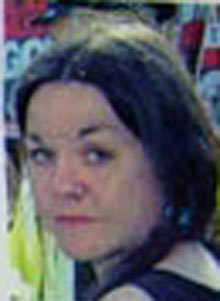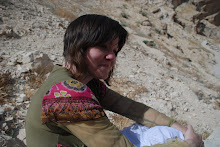http://media.gn.apc.org/fl/1003iwd.html
THE London Freelance Branch of the NUJ celebrates International Women's day with eminent journalists and leading campaigners for the recognition of women within the media industries: Dinah Caine, Kate Kinninmont and Katharine Whitehorn. On Monday 8 March London Freelance Branch of the NUJ invites members to celebrate International Women's day at its monthly meeting: 7pm at Friends House, Euston. We'll examine the urgent issue of how to "break through the boys' broadcast barrier": in the words of journalist Laura Flanders women are the "Real Majority, Media Minority". See below for details of our speakers on this and more.
 |
| Flyer for the meeting by Pennie Quinton (from a photo listed as public domain) - click to download A4 printable version (1 MB jpeg) |
Katharine Whitehorn
Born in 1928 in Hendon, Katharine Whitehorn is a British journalist, writer and columnist known for her wit and humour and as a keen observer of the changing role of women.
She was a sub-editor for a women's magazine in 1956 when Picture Post photographer Bert Hardy asked her to model for him. He photographed her for a story on loneliness in London: one Hardy photo of her sitting by a fire with a cigarette, as if thinking to write an article instead of being lonely, became an advertisement for the energy drink Lucozade.
She wrote for Picture Post just before it closed, then worked as a columnist for the Observer in London from 1960 until 1996. Her 1963 article on "Sluts", in the sense of "slovenly women" and identifying herself with the term, created a minor sensation.
She also served as the Rector of the University of St Andrews from 1982 to 1985. Since 1997 she has written a monthly column for Saga Magazine.
In 2009 she began presenting the short philosophical Friday evening programme on Radio 4 entitled A Point of View.
Dinah Caine OBE
Dinah Caine is Chief Executive Officer of Skillset, the Sector Skills Council for the Creative Media Industries whose mission is to "support the improvements to the productivity of our industry to ensure that it remains globally competitive". She previously worked in the Film and Video Workshop sector, at the British Film Institute and for the media & entertainment trade unions ACCT and then BECTU.
Until recently she was Deputy Chair of the Alliance of Sector Skills Councils and continues to chair their work in London. In that capacity she sits as an Advisor on the Mayor's London Skills and Employment Board.
She is currently a member of the British Screen Advisory Council and was until recently a Board Member of the joint Board of the Scottish Arts Council and Scottish Screen. She has also previously been a Board Member of the Northern Ireland Film and TV Commission and the Central London Training and Enterprise Council.
She is a Fellow of the Royal Society of Arts and was awarded Fellowship of the Royal Television Society for her outstanding contribution to the Television Industry in 2002.
She was awarded the OBE for her services to the Media Industries in the Queen's Golden Jubilee Honours List in 2002.
- See: www.skillset.org
Kate Kinninmont
Kate Kinninmont is Chief Executive of Women in Film and TV, "the premier membership organisation for the women in the industry", part of an international group with a membership of 10,000 around the world. As an award-winning TV producer and director, first with BBC then as a freelancer, Kate has filmed all over the world - from the dacha of Yevteshenko in Moscow to the bamboo hut of an aboriginal family in the tropical jungles of Malaysia.
For almost 20 years she has been an active volunteer with WFTV, running their Events Committee and chairing the Board of Directors for six years. She is a member of The Directors Guild of Great Britain, BAFTA and the NUJ, and is now delighted to be WFTV's full-time Chief Executive.
- See: www.wftv.org.uk
















